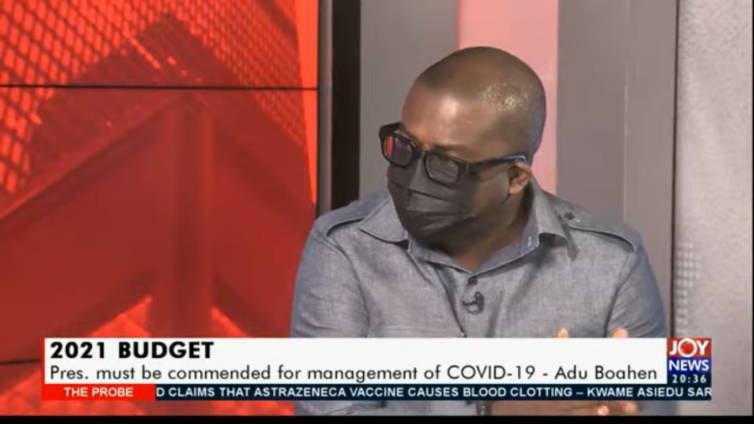The President’s Representative at the Finance Ministry, Charles Adu-Boahen says the 2021 budget which was presented to Parliament on Friday is anchored on debt sustainability.
Speaking on JoyNews’ The Probe Sunday, Mr Adu-Boahen indicated that government lost a huge amount in revenue mobilisation made additional expenditure due to some of the interventions it implemented to cushion Ghanaians amidst the Covid-19 pandemic
Thus, the government’s decision to use an immense portion of the revenue that is expected to be generated this year on settling debt before the country is caught in a debt trap.
“This is the first year that interest expense or payment will exceed compensation as the single largest item on the budget. In fact out of the 70 billion domestic revenue about 35 billion is for interest payment; so that is exactly 50 per cent. About 30 billion is on compensation so if you add the two that is 65 billion and that eats up your whole 70 billion in domestic revenue.”
The former deputy Minister told host Emefa Apawu that the global health crisis cost Ghana an amount of ₵25 billion, therefore, government had to resort to borrowing which has also raised the country’s debt to GDP.
“Covid-19 created a 25 billion financial gap between a shortfall in revenues and additional expenditure. So in order to fill the gap, we had to revise our deficit and take it up from 4.8 to 11.4 so we ended up borrowing a lot more than anticipated so by the end of the year we had a debt to GDP of about 76.1%.
“The 76.1% debt to GDP on its own is not scary. I think South Africa was projecting about 88% the UK just came out with theirs and they were about 97 or 98% in terms of where their debt to GDP. So everybody was getting highly leveraged because of the Covid-19 pandemic so it wasn’t unique,” he stated.
“What was scarier in our case was that we will get into a debt trap where you borrow to pay your debt. So our ability to service debt is what was challenging so we realized that we needed to anchor on debt sustainability.”
The President Representative further debunked assertions that government is shifting the burden on the ordinary Ghanaian.
In his view, Ghana’s GDP debt is a shared burden and urged all and sundry must support government as its gears the country towards a post Covid-19 recovery.
“I don’t think these [new] taxes are really hitting the poor. They are not income taxes, they are consumption taxes. Somehow we have to find a way to share the burden.
“We can’t borrow anymore, we have borrowed to the hilt so we have took at the revenue side of the equation that is why we are looking at some tax measures and we have really thought through this so that the burden is not so much that we cannot share [as a people],” he said.
Latest Stories
-
Jana Foundation urges young women to take up leadership roles
1 min -
All set for Joy FM Prayer Summit for Peace 2024
12 mins -
Managing Prediabetes with the Help of a Dietitian
31 mins -
Joy FM listeners criticise Achiase Commanding Officer’s election comment
52 mins -
Legal Aid Commission employees threaten strike over poor working conditions
55 mins -
Ghana ranked 7th globally as biggest beneficiary of World Bank funding
1 hour -
IMF board to disburse $360m to Ghana in December after third review
1 hour -
Former Bono Regional NPP organiser donates 13 motorbikes to 12 constituencies
1 hour -
Securities industry: Assets under management estimated at GH¢81.7bn in quarter 3, 2024
1 hour -
Gold Fields Ghana Foundation challenges graduates to maximise benefits of community apprenticeship programme
3 hours -
GBC accuses Deputy Information Minister Sylvester Tetteh of demolishing its bungalow illegally
3 hours -
Boost for education as government commissions 80 projects
3 hours -
NAPO commissions library to honour Atta-Mills’ memory
3 hours -
OmniBSIC Bank champions health and wellness with thriving community walk
3 hours -
Kora Wearables unveils Neo: The Ultimate Smartwatch for Ghana’s tech-savvy and health-conscious users
4 hours

